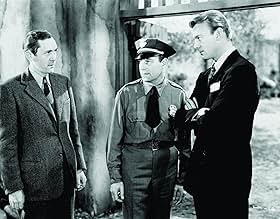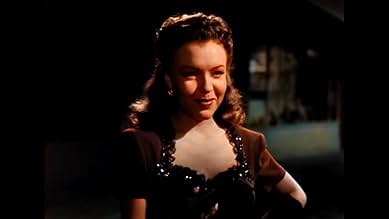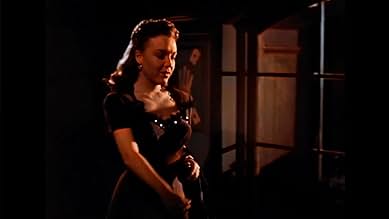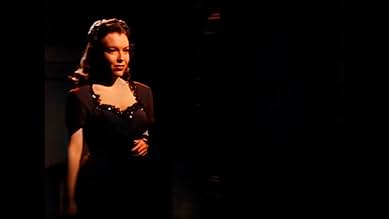IMDb-BEWERTUNG
6,7/10
6198
IHRE BEWERTUNG
Füge eine Handlung in deiner Sprache hinzuA seemingly-tame leopard used for a publicity stunt escapes and kills a young girl, spreading panic throughout a sleepy New Mexico town.A seemingly-tame leopard used for a publicity stunt escapes and kills a young girl, spreading panic throughout a sleepy New Mexico town.A seemingly-tame leopard used for a publicity stunt escapes and kills a young girl, spreading panic throughout a sleepy New Mexico town.
- Auszeichnungen
- 2 Nominierungen insgesamt
Tuulikki Paananen
- Consuelo Contreras
- (as Tula Parma)
Ed Agresti
- Mexican Police Officer
- (Nicht genannt)
Robert Andersen
- Dwight Brunton
- (Nicht genannt)
Lulu Mae Bohrman
- Nightclub Patron
- (Nicht genannt)
Jack Chefe
- Nightclub Waiter
- (Nicht genannt)
David Cota
- Boy Singer
- (Nicht genannt)
Sidney D'Albrook
- Waiter Serving Helene and Dwight
- (Nicht genannt)
Rosita Delva
- Young Lover
- (Nicht genannt)
Jacqueline deWit
- Helene
- (Nicht genannt)
John Dilson
- Coroner
- (Nicht genannt)
Handlung
WUSSTEST DU SCHON:
- PatzerAt the nightclub, Kiki is seated at a table with Jerry and Galbraith. As she asks Galbraith why he gave up teaching, a slim dark-haired woman wearing a matching suit and hat walks past their table. The shot cuts to Galbraith saying 'Various reasons', and the woman can be seen behind him (just over his shoulder on the far left of the screen), already seated at a nearby table.
- Zitate
Charlie How-Come: You don't get the idea, mister. These cops banging those pans, flashing those lights, they're gonna scare that poor cat of mine. Cats are funny, mister. They don't want to hurt you, but if you scare them they go crazy. These cops, they don't know what they're doing.
- Alternative VersionenSome older TV prints of "The Leopard Man" run 59 minutes.
- VerbindungenFeatured in Terror on Twelve: The Leopard Man (1964)
- SoundtracksLas Mañanitas
(uncredited)
Traditional Mexican birthday song
Performed by Fely Franquelli and Ottola Nesmith
Ausgewählte Rezension
A far better than average early film from the Val Lewton unit, The Leopard Man is as much murder mystery as horror picture. It is set in a New Mexico town where there are some weird goings on, including, among other things, big cat attacks. The photography is exceptional, moving from subjective to documentary-style objective without drastically altering the tone of the picture. What horror there is comes more from a sense of dread than anything that actually happens; also from the eerie feeling that certain places are unlucky, that some people are bound to die simply because of where they are. How true.
The star players are somewhat dull, but the supporting cast is quite good. And the merging and sometime colliding of the Anglo, Hispanic and Indian cultures is nicely presented. There is a sense of primitive feeling, of old religion, throughout the film, implied rather than stated, that is beyond the grasp of the hyper-rational lead players. We can catch this mood in fits and starts, but like the major characters, it eludes our grasp. Jacques Tourneur's direction is masterful every step of the way; and he uses music sensually yet emphatically, and the result is a fine-tuned film. It's major flaw is the revelation of the culprit, yet once Tourneur accepted the script's limitations he works superbly within them. The best thing about the movie is that its most crucial events happen mostly off-screen, leaving a good deal to our imaginations. And the minimalist script leaves a great deal in the dark, and even after the picture's florid, almost surreal climax, the air of mystery lingers. There are loose ends for sure, but Tourneur's polite, civilized touch dresses them up to appear profound and suggestive rather than threadbare, and the result is a pleasing conclusion that does not quite give the whole thing away; and we are left wanting to know just a little bit more. Tourneur was a true master.
The star players are somewhat dull, but the supporting cast is quite good. And the merging and sometime colliding of the Anglo, Hispanic and Indian cultures is nicely presented. There is a sense of primitive feeling, of old religion, throughout the film, implied rather than stated, that is beyond the grasp of the hyper-rational lead players. We can catch this mood in fits and starts, but like the major characters, it eludes our grasp. Jacques Tourneur's direction is masterful every step of the way; and he uses music sensually yet emphatically, and the result is a fine-tuned film. It's major flaw is the revelation of the culprit, yet once Tourneur accepted the script's limitations he works superbly within them. The best thing about the movie is that its most crucial events happen mostly off-screen, leaving a good deal to our imaginations. And the minimalist script leaves a great deal in the dark, and even after the picture's florid, almost surreal climax, the air of mystery lingers. There are loose ends for sure, but Tourneur's polite, civilized touch dresses them up to appear profound and suggestive rather than threadbare, and the result is a pleasing conclusion that does not quite give the whole thing away; and we are left wanting to know just a little bit more. Tourneur was a true master.
Top-Auswahl
Melde dich zum Bewerten an und greife auf die Watchlist für personalisierte Empfehlungen zu.
Everything New on Max in January
Everything New on Max in January
Looking for something different to add to your Watchlist? Take a peek at what movies and TV shows are coming to streaming this month.
Details
- Laufzeit1 Stunde 6 Minuten
- Farbe
- Seitenverhältnis
- 1.37 : 1
Zu dieser Seite beitragen
Bearbeitung vorschlagen oder fehlenden Inhalt hinzufügen

Oberste Lücke
By what name was The Leopard Man (1943) officially released in India in English?
Antwort
































